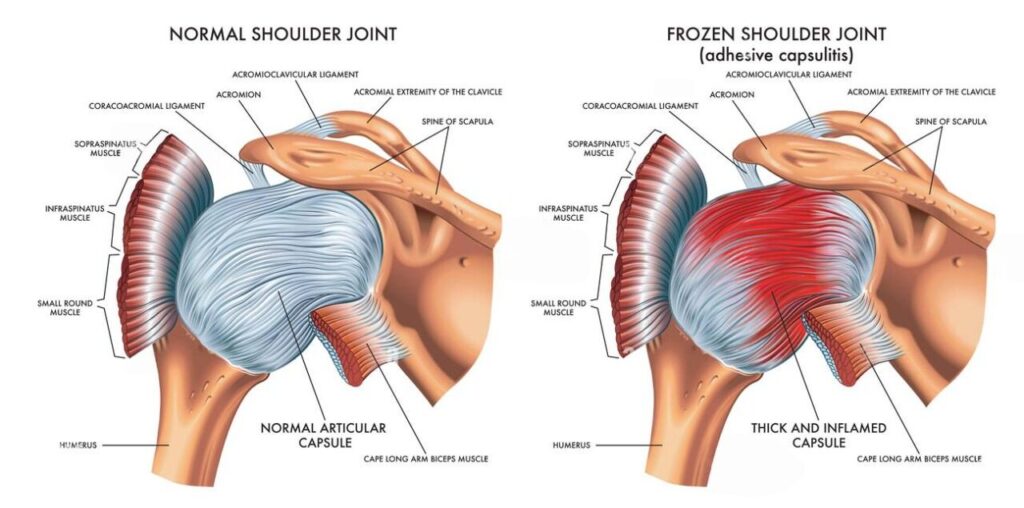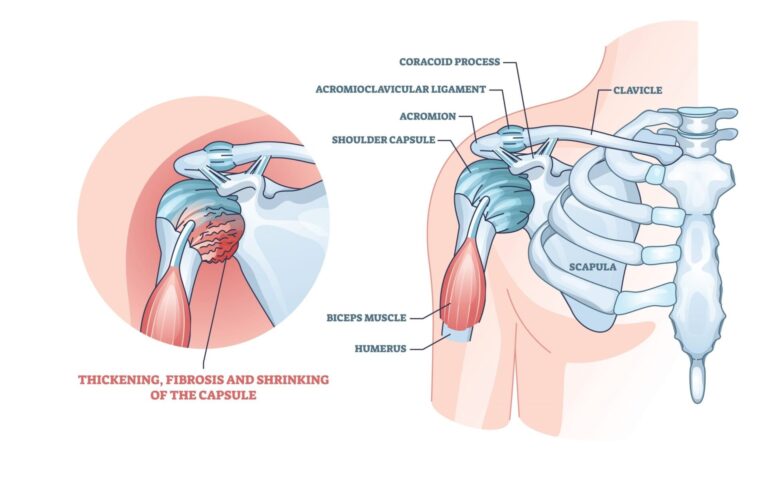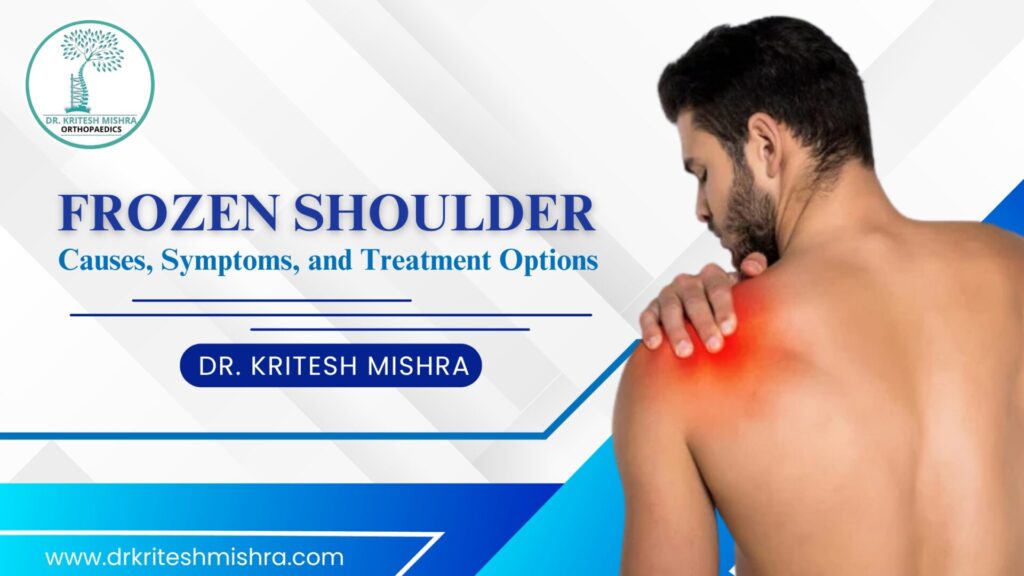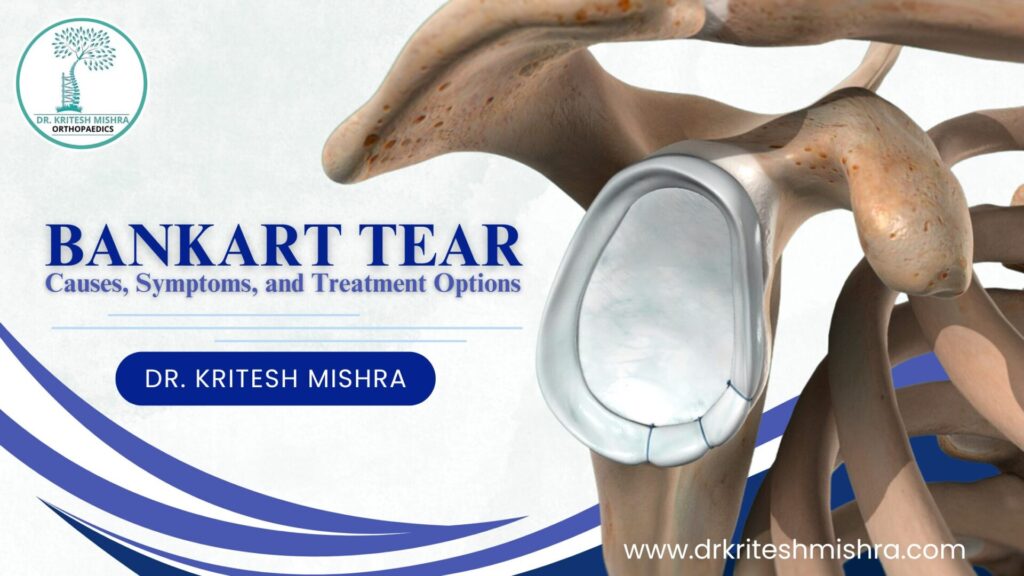Frozen shoulder, also known as adhesive capsulitis, is a common condition that causes stiffness, pain, and limited movement in the shoulder joint. It typically develops gradually and can significantly impact daily activities. Understanding the causes, symptoms, and available treatment options is essential for effectively managing frozen shoulder. If you are struggling with shoulder pain and mobility issues, consult Dr. Kritesh Mishra, Joint Replacement & Sports Injury Specialist for expert guidance and personalized care.
What Causes Frozen Shoulder?
Frozen shoulders occur when the capsule around the shoulder joint becomes inflamed and thickened, restricting movement. While the exact cause is not always clear, several factors can contribute to its development:
Injury or Trauma: A shoulder injury or surgery can lead to immobility, increasing the risk of developing frozen shoulder.
Diabetes: People with diabetes are more likely to experience frozen shoulder.
Age and Gender: It is more common in individuals aged 40-60, with women being at higher risk.
Medical Conditions: Conditions like thyroid disorders, heart disease, or Parkinson’s disease can increase the chances of developing frozen shoulders.
Prolonged Immobilization: Lack of shoulder movement due to fractures, strokes, or surgeries can trigger this condition.

Recognizing the Symptoms
It usually progresses through three stages, with symptoms worsening and improving over time. These stages include:
Freezing Stage:
Gradual onset of pain that worsens over time.
Limited range of motion in the shoulder.
Pain intensifies, especially at night.
Frozen Stage:
Pain may begin to subside, but stiffness increases.
Shoulder movement becomes significantly restricted.
Daily tasks like dressing or reaching for objects become challenging.
Thawing Stage:
Gradual improvement in mobility.
Pain diminishes, and the shoulder starts regaining movement.
Diagnosis of Frozen Shoulder
To diagnose frozen shoulders, doctors will evaluate the patient’s medical history, perform a physical examination, and check the range of motion. Imaging tests like X-rays or MRI scans may be recommended to rule out other conditions, such as arthritis or rotator cuff injuries.

Treatment Options
Managing frozen shoulders requires a combination of treatments aimed at reducing pain and restoring movement. Below are the most common treatment options:
Physical Therapy:
Physical therapy is one of the primary treatment methods for frozen shoulder.
Exercises help stretch and strengthen the shoulder muscles, improving flexibility and range of motion.
Medications:
Over-the-counter pain relievers, such as ibuprofen or acetaminophen, can help reduce inflammation and manage pain.
In some cases, doctors may recommend corticosteroid injections to provide relief from severe pain.
Hot and Cold Therapy:
Applying heat packs can relax shoulder muscles, while cold compresses reduce inflammation and numb pain.
Joint Distension:
This procedure involves injecting sterile fluid into the shoulder joint to stretch the capsule and improve mobility.
Surgery (in Severe Cases):
If conservative treatments do not provide relief, surgery may be considered.
Procedures such as manipulation under anesthesia (MUA) or arthroscopic surgery help release the stiffened shoulder capsule.
Preventing Frozen Shoulder
While frozen shoulders cannot always be prevented, certain steps can reduce the risk:
Perform gentle shoulder exercises regularly.
Avoid prolonged immobility after an injury or surgery.
Manage underlying health conditions like diabetes and thyroid disorders effectively.
Conclusion
It can be a challenging condition, but with timely diagnosis and the right treatment, recovery is possible. If you experience persistent shoulder pain and stiffness, seek help from an expert to regain mobility and improve your quality of life. Early intervention plays a crucial role in preventing complications and ensuring a smoother recovery process. For advanced care and treatment, reach out to Dr. Kritesh Mishra, Joint Replacement & Sports Injury Specialist, who can provide personalized solutions to address frozen shoulder effectively.
Frequently Asked Questions
What is frozen shoulder?
It is a condition where the shoulder becomes stiff and painful, limiting its range of motion.
What causes frozen shoulder?
It can be caused by inflammation, injury, or conditions like diabetes, leading to the thickening and tightening of the shoulder capsule.
What are the symptoms of frozen shoulder?
Symptoms include pain, especially at night, and a gradual loss of shoulder movement, making it difficult to perform daily activities.
How is frozen shoulder treated?
Treatment may include physical therapy, anti-inflammatory medications, corticosteroid injections, or surgery in severe cases.
How long does it take to recover from frozen shoulder?
Recovery can take anywhere from several months to a couple of years, depending on the severity of the condition and the treatment approach.



